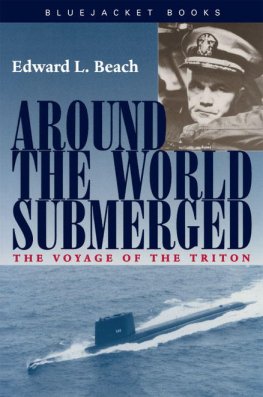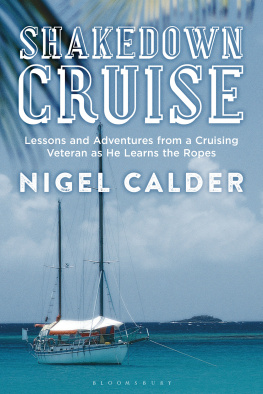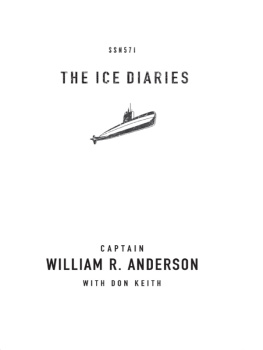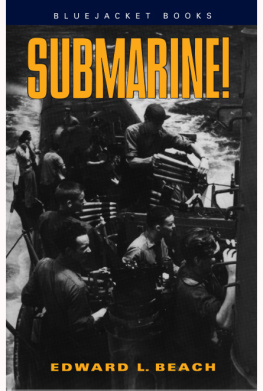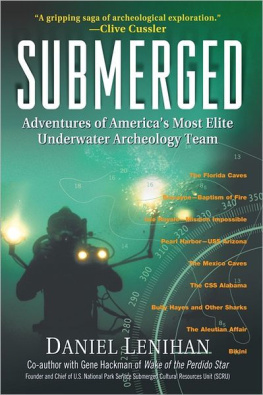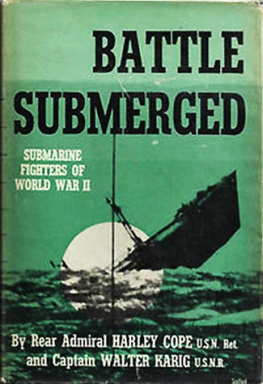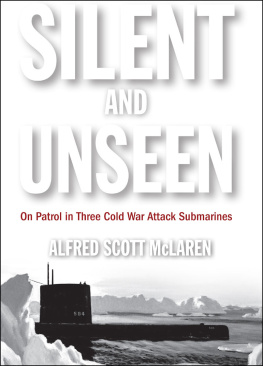Our Log ended at sea, ready for pickup on the morning of the tenth of May, its last entry written several hours in advance of the event in order to have it properly typed and ready upon arrival. Tying up loose ends took until the small hours of the morning, and I finally turned in, exhausted, to get a few hours of sleep before the rendezvous. It fell to Will Adams, therefore, to have the honor of bringing Triton back to the surface just before dawn. I was awakened by the jolt of high-pressure air roaring into her twenty-two main ballast tanks.
As we slowly steered toward the appointed place off Rehoboth Beach, leaden gray skies gradually replaced the dark overcast of night. With the day came our first visitor, a curious sea bird winging in graceful circles and figure eights overhead, swooping in civilized instinct low over our wake for the bits of garbage which he and his fellows have long learned to associate with ships at sea. Land itself was not to be seen, and we might as well have been in the middle of the Atlantic, or in the Pacific, half a world away. But this romantic notion lasted only a short time. Soon our sea bird was joined by another type of bird, a land variety with wheels, a fixed wing, and a propeller glinting light from its nose. Behaving like its handsome wild cousin, the small plane flew low to pass by our side at close range. We waved vigorously at its occupants, who could clearly be seen waving in return. One of them, holding a large camera, appeared to be taking pictures.
Soon, another small plane joined the first one, and then a third. And speeding out of the west, where the shadows of early morning were yet visible in the horizon haze, the bows of a speedboat pushed a white mustache of water in front of it. It looked familiar as it came closer, and in a few minutes, as it turned broadside, I remembered where I had last seen this powerful craft, or one like it. An experimental postwar PT boat, it had been based at the old Washington Navy Yard for the past several years. The Officer-in-Charge was known as a person whose knowledge of the Potomac River and ability to handle small craft were second to none in the Navy. I wondered if it was indeed the same boat, if Walter Slye had been sent to meet us, and indeed whether or not he still held the post. Binocular inspection brought no answer while the boat was still bows on, but when it sheared off and presented its silhouette, the interior of the cockpit became visible and revealed Slye himself, uniform cap, as always, perched squarely on the top of his head. With delight, I waved my cap to him, and he waved back.
It seemed only a few minutes, though it must have been some time later, that one of the lookouts reported the approach of two helicopters lumbering toward us from the hidden continent to the west. Radioed instructions had prepared us; I went on deck with George Sawyer and the helicopter landing party. When one of the machines hovered over our deck aft to lower a strange inverted mushroom-shaped object to us, I set my hat firmly on my head, ignored the fluttering roar and wind from the whirling blades, and seated myself on it, straddling the center stalk and wrapping my arms around it. To my surprise, the mushroom, which had looked like metal of some kind, felt like foam rubber and was not a bit uncomfortable. I looked down. George was already many feet below me, holding up a signal flag, and Triton was receding at a rapid pace. There was suddenly something alongside methe fuselage of the helicopter and a yawning door into the interior. Friendly faces stared at me and friendly arms reached out to steady the mushroom seat.
Dismounting, I pressed my face against the Plexiglass window of the passenger compartment to see the ship in which I had spent nearly a quarter of a year under water. She looked small, out of her element on the surface. Her sturdy sides were mottled where the paint had been stripped away, and they were speckled here and there with discolorations of rust. A small knot of men stood on her deckthe helicopter handling party whom I had just leftand a group of heads were clustered on her bridge. Slowly, under the command of Will Adams, she gathered way on the leisurely course toward New London which had been directed, holding her speed unaccustomedly low and making only a tiny bow wave. Quickly, she vanished in the distance.
The clattering of the helicopter engine made conversation practically impossible in the passenger compartment, and someone handed me a piece of paper on which was written, What was your first impression of the world after returning to it? I wrote back, It smells fishy! This was the most immediate sensation, a fishlike odor which had seemed to permeate the entire superstructure of the ship. A number of suckerlike organisms had attached themselves to the bridge area, and there were no doubt many more of them throughout the ships immense superstructure. There would have to be a pretty thorough scraping, scaling, and repainting job done during our post-shakedown overhaul, I reflected.
The grinding beat of the rotating blades brought us over a sandy beach, then some green and plowed farm fields. Here and there were houses. We passed one moderate-sized city, then suddenly were over a bigger one. The helicopter dipped lower. I could see streets and automobiles, and people walking on the sidewalks. There was a surprising number of trees, in many cases almost entirely concealing the streets beneath them. Then we were over a large muddy river. A tall stone obelisk, standing in the midst of a great expanse of grass, reached almost up to us. The helicopter ceased its forward motion, swayed gently fore and aft, swung completely around once or twice, slowly settled. Below us was more grass, a carefully kept lawn dominated by a large building. With a thrill I recognized the White House. The plane landed gently just a few yards in front of the South Portico.
The next two hours were, to say the least, kaleidoscopic. Scores of well-wishers greeted me. I shook hands a hundred times, and suddenly a pair of arms went around my neck from behind and a familiar kiss landed on my ear. There stood Ingrid, looking somewhat breathless but otherwise exactly as I had remembered her these three months.
How is everybody? I asked.
Fine, she said.
Come along, someone else saidand the next thing I knew I was talking to the President.
In my hand I carried a letter and envelope addressed to President Eisenhower, carefully cacheted with a replica of our circumnavigation plaque which we had printed with homemade ink. There had been a number of experimental inks concocted, but the most successful onehydraulic oil, ground charcoal, and insulating paint, as I recallwas extremely slow in drying. To protect the envelope from being smudged, I had wrapped it, along with others for Mrs. Eisenhower, the Secretary of Defense, and the Secretary of the Navy, in the only readily available highly absorbent paper we had. Now, standing before the Commander in Chief of the Armed Forces, I shook his proffered hand, reported successful completion of our mission, and handed him the letter we had so painstakingly prepared for him. Only then, to my horror, did I realize that I had neglected to remove the protective paper covering.
Whats this? the President asked, with a slightly puzzled frown.
I froze with the realization of the enormity of my faux pas. Itsits just a little toilet paper we had to use to keep the ink from smudging, I blurted out despairingly.
I had worked for the President in the fairly intimate capacity of Naval Aide a few years earlier, but nothing in our relationship had prepared me for this situation. I had never lost my feeling of great awe for him, and I stood rooted to the rug in his office, waiting for I knew not what result of this indignity.
People who knew President Eisenhower longer and better than I might perhaps have been able to predict his reaction. For my part, it was with the greatest relief that I became witness to a magnificent set of Presidential Ha has and Ho hos, delivered as he shook with mirth, steadying himself with one hand braced on the top of his desk.


